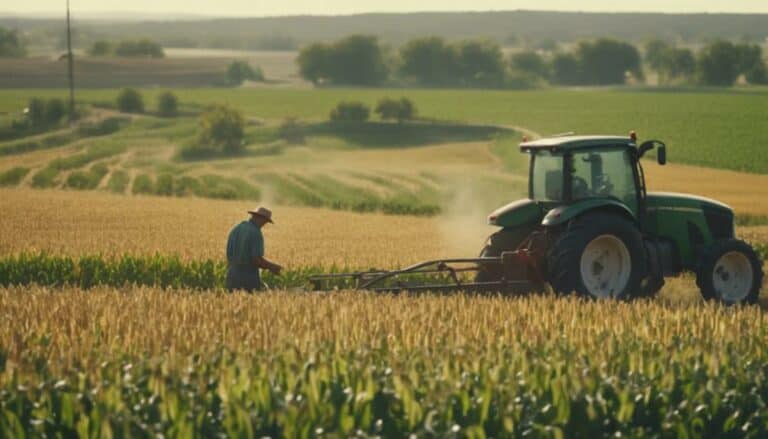Enhance your ranch's self-sufficiency by using vermicomposting to enrich soil with essential nutrients and improve structure, water retention, and pest resistance. Rotate crops strategically, intercrop species, and employ natural pest control like marigolds and neem oil. Conserve water with drip irrigation, rainwater harvesting, and mulching. Composting kitchen scraps and yard waste can create organic feed rich in nutrients for livestock. By mastering these techniques, you can produce organic feed on your ranch efficiently and sustainably. Your animals and soil will thank you for the nutritious, homegrown meals they receive.
Key Takeaways
- Composting recycles nutrients for organic feed production
- Vermicomposting enriches feed with essential nutrients
- Incorporate kitchen scraps and yard waste into compost
- Rotate crops to produce diverse feed sources
- Utilize cover crops and legumes for feed sustainability
Soil Enrichment Techniques
To enhance the fertility and structure of your soil for best plant growth on your ranch, consider implementing various soil enrichment techniques. Vermicomposting benefits your soil by providing a rich source of organic matter and essential nutrients through the activity of earthworms. These creatures break down organic materials efficiently, creating vermicompost, which improves soil structure, water retention, and nutrient availability. Additionally, vermicompost helps suppress plant diseases and pests, promoting healthier plant growth on your ranch.
When considering soil amendment options, think about incorporating compost made from kitchen scraps and organic waste. This process not only recycles nutrients back into the soil but also improves soil structure and enhances microbial activity. Cover crops like legumes and grasses can further boost soil fertility by fixing nitrogen and increasing organic matter content. Biochar, a form of charcoal produced from organic matter, can be added to the soil to enhance nutrient retention and water-holding capacity, ultimately supporting excellent plant growth on your ranch.
Crop Rotation Strategies
Consider implementing diverse crop rotation strategies on your ranch to maintain soil fertility and minimize pest infestations while promoting plant health. Crop rotation involves planting different crops in succession to break pest life cycles and improve overall soil health. Rotating crops like legumes with vegetables can fix nitrogen in the soil, benefiting subsequent crops. Alternating deep-rooted crops with shallow-rooted ones helps break up soil compaction and enhances soil structure. Effective crop rotation can lead to higher yields, healthier plants, and sustainable farming practices in the long run.
| Crop Rotation Strategies | Benefits |
|---|---|
| Plant a cover crop after harvesting main crop | Helps prevent soil erosion and adds organic matter |
| Rotate nitrogen-fixing legumes with nutrient-demanding crops | Enhances soil fertility and reduces the need for synthetic fertilizers |
| Alternate root depth of crops | Improves soil structure and water retention |
| Intercrop different species | Deters pests and diseases through biodiversity |
| Include fallow periods in rotation | Allows soil to rest and regenerate nutrients |
Natural Pest Control Methods
Implement companion planting with marigolds to naturally deter pests and attract beneficial insects in your organic farming practices. Companion planting benefits include creating a natural pest control system by using the odors and chemicals released by certain plants to repel harmful insects. Marigolds, in particular, are known for their ability to ward off nematodes, beetles, and other pests while drawing in pollinators like bees and butterflies.
To further combat pests, consider using neem oil spray, a natural insecticide derived from the neem tree. Neem oil effectiveness extends to controlling common garden pests such as aphids, mites, and whiteflies without harming beneficial insects. This organic solution provides a safe alternative to chemical pesticides, promoting a healthy ecosystem in your garden.
In addition to plant-based methods, introduce beneficial insects like ladybugs and lacewings to your garden. These predators feed on harmful pests, helping to keep populations in check naturally. By incorporating these natural pest control methods into your farming routine, you can maintain a balanced and thriving organic environment.
Water Conservation Practices
Using efficient water conservation practices is essential for maintaining a sustainable and thriving garden ecosystem.
Drip irrigation benefits are significant, as implementing drip systems can reduce water usage by up to 50% compared to traditional methods.
Rainwater harvesting techniques, such as collecting rain in storage tanks, provide a sustainable water source for irrigation during dry periods, reducing reliance on external sources.
Mulching around plants plays a vital role in retaining soil moisture, decreasing the frequency of watering needed.
Water-efficient irrigation methods like soaker hoses and micro-sprinklers help minimize water wastage by delivering water directly to the root zone.
Installing water-saving devices like rain sensors on irrigation systems prevents unnecessary watering after rainfall, optimizing water usage.
Composting for Organic Feed
How can composting be utilized to create nutrient-rich organic feed for your livestock on the ranch? Composting plays an essential role in nutrient cycling and can provide a sustainable source of organic feed supplementation for your animals.
Here are three key points to keep in mind when using composting for organic feed:
- Compost maintenance: Regularly turning the compost pile promotes aeration and decomposition, aiding in the breakdown of materials into valuable nutrients for your livestock.
- Nutrient cycling: Composting allows for the recycling of essential nutrients from kitchen scraps, yard waste, and manure, creating a nutrient-rich feed source that benefits both the animals and the soil.
- Livestock nutrition: Incorporating finished compost into the animals' diet can supplement their nutritional needs, promoting overall health and well-being while reducing the reliance on external feed sources.
Conclusion
To sum up, by implementing soil enrichment techniques, crop rotation strategies, natural pest control methods, water conservation practices, and composting for organic feed, you can successfully produce homegrown meals on your ranch.
Embracing these sustainable practices won't only benefit the health of your crops and livestock but also contribute to the overall well-being of the environment.
Remember, Rome wasn't built in a day, so be patient and persistent in your efforts to cultivate a thriving organic farm.

